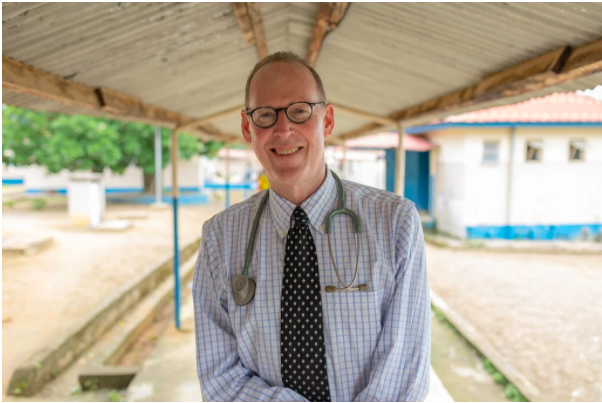
Paul Farmer, M.D., Ph.D. — physician, Harvard Medical School professor and medical anthropologist — believes that health care is a universal human right. On March 16 he hosted a one-hour Zoom conversation exclusively for Siena students, as part of the Mission Office’s Women’s Leadership Series.
Dr. Farmer is a co-founder of Partners in Health, a Boston-based nonprofit that delivers health care through clinic and home visits in some of the poorest nations in the world, in partnership with their local governments. Part of their mission states, “we strive to achieve two overarching goals: to bring the benefits of modern medical science to those most in need of them and to serve as an antidote to despair.”
Both he and event moderator Beth DeAngelis, senior director of the Sr. Thea Bowman Center for Women, noted that PIH’s mission statement reflects well the Franciscan mission of Siena.
Rather than deliver a lecture, Dr. Farmer informally fielded questions from a panel of Siena students who are planning on careers in medicine, nursing and social work.
“I feel extremely fortunate to have been given the opportunity to speak to and learn directly from Dr. Farmer and his experiences,” said Marlie Frisco ‘21. “Dr. Farmer was gracious, humble, and well-equipped to answer any and all of our questions regarding arguably some of the most important topics in the field. His passion for others is contagious and I look forward to joining him in the fight for equity in the upcoming years as a nurse.”
Dr. Farmer has been lauded by numerous organizations for his decades of work around the globe in medical humanitarianism: he was a 1993 MacArthur Fellow and received the National Academy of Science’s 2018 Public Welfare Medal. For his leadership during the coronavirus pandemic, he received the 2020 Berggruen Prize, which is awarded to those who “have profoundly shaped human self-understanding and advancement in a rapidly changing world.” He has been the chair of the Department of Global Health and Social Medicine at Harvard Medical School since 2009.
He explained that at its root, his life’s work and that of PIH is “both medical and moral,” and is based on cooperation and solidarity, rather than simply charity. His response to Kaitlin Davis ’21, who asked about the significance of establishing sustainable health care in developing countries and the importance of empowerment and care for women and building those sustainable systems:
“If you believe in empowerment, you believe in the empowerment of women and girls, and if you know the data, as I know you do, that's a sure way to improve conditions for everyone. On the other hand is the entire question of sustainability, and I will just say it this way: I do not trust ‘sustainability’ as a diagnosis. Be very cautious of that, because that's a great way to turn away from very necessary interventions. Don’t just ask questions of sustainability, ask how we should proceed as humans. It's a mistake, very often, to declare something unsustainable because it leads to having it not be sustained.”
Sarah Hewitt ’21 asked how PIH specifically tends to the needs of women in each of the countries it serves.
“We must think about the idea of gender equity as an overarching concern like human rights - a platform, a paradigm, a framework – then we're smart to engage that question everywhere, regardless of whether it’s Siberia, Haiti, Navajo or Boston,” he said.
Dr. Farmer said the first question to ask when exploring ways to serve a certain area is “What is the burden of disease?” In other words, the malaria that plagues Malawi is not an issue mountainous Lesotho. “Then you ask, how do we close the gaps in coverage.”
He said the best way to amplify the voices of women in health care is “to start by hiring them.” He acknowledges that there can be barriers to that, and gave the example of Haiti, where literacy was a requirement for medical training. The education of girls there, as in many countries, has not been considered a priority.
“Haiti’s literacy requirement skewed the medical class toward men, so we eliminated it as an application requirement and committed to teach the women to read and write.”
Davis said what inspired her the most about Dr. Farmer was his unwillingness to accept the faults or gaps in a health care system, but to find ways to remedy them.
“He took on helping communities of people that are often forgotten, or not deemed worthy enough of care,” she said. “He said himself the best way to make change is through persistence. I admire his commitment to maintaining hope and it is something I hope to take with me in my future career in medicine.”
Social work major Laine Foster ’21 said joining in the conversation with Dr. Farmer was an honor.
“His work with Partners in Health is inspiring to many who go into a health care profession, and personally his encouragement of women’s education to better society was invaluable to be able to discuss with him. The most motivating part of the event was getting to know the intelligent and hard-working women who were on the panel with me.”